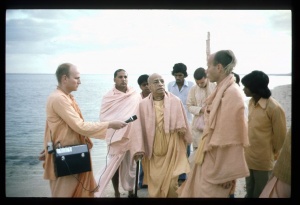CC Adi 13.79 (1975)

A.C. Bhaktivedanta Swami Prabhupada
TEXT 79
- putra pāñā dampati hailā ānandita mana
- viśeṣe sevana kare govinda-caraṇa
SYNONYMS
putra—son; pāñā—having gotten; dampati—husband and wife; hailā—became; ānandita—pleased; mana—mind; viśeṣe—specifically; sevana—service; kare—render; govinda-caraṇa—the lotus feet of Lord Govinda.
TRANSLATION
The husband and wife [Jagannātha Miśra and Śacīmātā], having gotten Viśvarūpa as their son, were very pleased within their minds. Because of their pleasure, they specifically began to serve the lotus feet of Govinda.
PURPORT
There is a common saying in India that everyone goes to worship the Supreme Personality of Godhead when he is in distress, but when a person is in an opulent position, he forgets God. In Bhagavad-gītā (7.16) this is also confirmed:
- catur-vidhā bhajante māṁ
- janāḥ sukṛtino 'rjuna
- ārto jijñāsur arthārthī
- jñānī ca bharatarṣabha
"If backed by pious activities in the past, four kinds of men-namely, those who are distressed, those in need of money, those searching after knowledge and those who are inquisitive-become interested in devotional service." The husband and wife, Jagannātha Miśra and Śacīmātā, were very unhappy because their eight daughters had passed away. Now, when they got Viśvarūpa as their son, certainly they became extremely happy. They knew that it was by the grace of the Lord that they were endowed with such happiness and opulence. Therefore instead of forgetting the Lord, they became more and more adherent in rendering service to the lotus feet of Govinda. When a common man becomes opulent, he forgets God; but the more opulent a devotee becomes by the grace of the Lord, the more he becomes attached to the service of the Lord.